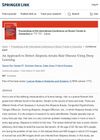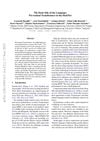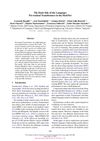 2 citations,
January 2019 in “Medizinische Genetik”
2 citations,
January 2019 in “Medizinische Genetik” The document reports findings on genetic research, including ethical concerns about genome editing, improved diagnosis of mitochondrial mutations, solving inherited eye diseases, confirming gene roles in epilepsy, linking a gene to aneurysms, and identifying genes associated with age-related macular degeneration.
 9 citations,
January 2020 in “IEEE Access”
9 citations,
January 2020 in “IEEE Access” The KEBOT system is a highly accurate AI tool for analyzing hair transplants.
 August 2023 in “Clinical, Cosmetic and Investigational Dermatology”
August 2023 in “Clinical, Cosmetic and Investigational Dermatology” Research on the human skin microbiome has grown, focusing on skin health and diseases, with more studies needed on antibiotic resistance and AI applications.
[object Object] 8 citations,
May 2024 in “Diagnostics” AI chatbots can help teach dermatology but need careful checking for accuracy.

Deep learning can improve non-invasive alopecia diagnosis using hair images.
 November 2022 in “bioRxiv (Cold Spring Harbor Laboratory)”
November 2022 in “bioRxiv (Cold Spring Harbor Laboratory)” Using deep learning to predict gene expression from images could help assess colorectal cancer metastasis.
 January 2021 in “Lecture notes in networks and systems”
January 2021 in “Lecture notes in networks and systems” Deep learning can accurately detect Alopecia Areata with up to 98.3% accuracy.
 1 citations,
October 2023
1 citations,
October 2023 Syntax-based neural networks can match Transformers in handling unseen sentences.

Pre-trained Transformers need extreme retraining to perform well on DarkNet data.
 December 2022 in “Research Square (Research Square)”
December 2022 in “Research Square (Research Square)” The document concludes that an automatic system using deep learning can help diagnose skin disorders, but challenges and opportunities in this area remain.

The model accurately classifies hair conditions with 97% accuracy.
 September 2024 in “Journal of Investigative Dermatology”
September 2024 in “Journal of Investigative Dermatology” A new tool can analyze hair to detect changes due to hormones, genetics, and aging.
 April 2024 in “Materials today bio”
April 2024 in “Materials today bio” The CuCS/Cur wound dressing helps regenerate nerves and heal deep skin burns by rebuilding hair follicles.
 February 2024 in “Frontiers in physics”
February 2024 in “Frontiers in physics” The new model detects hair clusters more accurately and efficiently, helping with early hair loss treatment and diagnosis.
 January 2025 in “PLoS ONE”
January 2025 in “PLoS ONE” ING5 is crucial for stem cell maintenance and preventing certain cancers.
 October 2023 in “International Journal For Multidisciplinary Research”
October 2023 in “International Journal For Multidisciplinary Research” Women with PCOS face many health risks, but exercise, a healthy diet, and weight management can help.
[object Object]  11 citations,
April 2013 in “SpringerPlus”
11 citations,
April 2013 in “SpringerPlus” Human skin's melanocytes respond to light by changing shape, producing pigments and hormones, which may affect sleep patterns.
 24 citations,
November 2018 in “International Journal of Molecular Sciences”
24 citations,
November 2018 in “International Journal of Molecular Sciences” Ethosomes improve drug delivery through the skin but may have side effects like irritation.
 January 2024 in “Wiadomości Lekarskie”
January 2024 in “Wiadomości Lekarskie” Robotic hair transplantation with AI offers more reliable, precise, and efficient hair restoration.

The study aims to create a model to improve personalized and preventive health care.
 165 citations,
October 2013 in “Nature Communications”
165 citations,
October 2013 in “Nature Communications” Scientists made working salivary glands in mice using bioengineered cells, which could help treat dry mouth.
 139 citations,
December 2020 in “Cell Stem Cell”
139 citations,
December 2020 in “Cell Stem Cell” Male hormones affect COVID-19 severity and certain drugs targeting these hormones could help reduce the risk.
 115 citations,
November 2004 in “Brain Behavior and Immunity”
115 citations,
November 2004 in “Brain Behavior and Immunity” Stress increases nerve fibers and immune cell activity in mouse skin, possibly worsening skin conditions.
 103 citations,
June 2018 in “International Journal of Molecular Sciences”
103 citations,
June 2018 in “International Journal of Molecular Sciences” FGF signaling is a promising target for developing treatments for wounds, metabolic diseases, and cancer.
 30 citations,
March 2017 in “ACS biomaterials science & engineering”
30 citations,
March 2017 in “ACS biomaterials science & engineering” Hair follicles are valuable for regenerative medicine and wound healing.
 12 citations,
June 2021 in “Scientific Reports”
12 citations,
June 2021 in “Scientific Reports” Curcumin may help reverse aging by targeting specific genes.
 1 citations,
November 2016 in “Congenital Anomalies”
1 citations,
November 2016 in “Congenital Anomalies” Get head MRI for babies with achondroplasia early, use free immunoglobulin light chains to detect certain neurodevelopmental disorders, and video calls work for speech therapy in patients with facial anomalies.
 August 2024 in “Biomolecules & Therapeutics”
August 2024 in “Biomolecules & Therapeutics” A new compound, HTPI, promotes hair growth by protecting cells from damage and regulating energy use.

Autonomous robotic surgery is advancing but still requires human supervision for complex procedures.
 November 2022 in “CARDIOMETRY”
November 2022 in “CARDIOMETRY” A group has developed therapies that show promise for treating cancer and various other conditions.




























